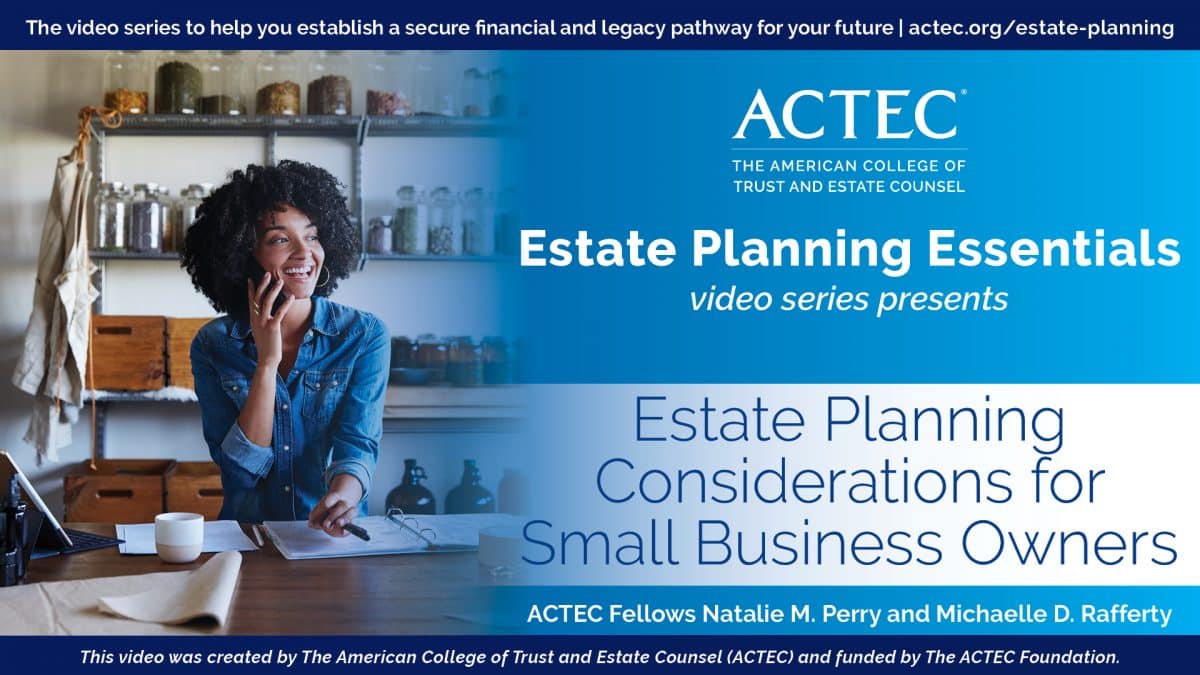You may want to update your estate plan for life changes (marriage, divorce), aging parents listed as executors or trustees, children that have grown up, small business changes, and more.
ACTEC Fellows Nancy C. Hughes and Natalie M. Perry discuss five reasons to update your will and estate plan to ensure your evolving wishes stay aligned.
Transcript
Hello. I’m Natalie Perry, an ACTEC Fellow from Chicago, Illinois, and I’m here today with Nancy Hughes, an ACTEC Fellow from Birmingham, Alabama. We’re going to talk about some reasons to update your estate plan.
Nancy, I’ve got a few questions for you. If I move out of state, is that a trigger to update my estate plan? Because I know some states have different laws than others, but then again, testamentary law hasn’t changed that much in many years. What do you think I should tell my clients?
Moving and Your Estate Plan
Nancy Hughes: So, if you move across state lines, typically, the will will be good from one state to the next if it was good in the state you executed it in. So, if you executed it with me in Alabama, then when you got to Illinois, it would be fine. The problem is the other documents are very state-specific. So your Living Will, end-of-life health care choices, your Power of Attorney, those are very state-specific and so we would want to look at those when you move from one state to the other.
Divorce and Your Estate Plan
Natalie Perry: Okay, that’s good information. What about when a client gets divorced? Because we always get clients coming in our office saying either they’re thinking about getting a divorce or they’ve gotten a divorce. Is that something where they need to update their estate plan, or are there other considerations?
Nancy Hughes: Absolutely, even though most state laws would provide that when you get a divorce, your ex-spouse can no longer inherit from you. However, there are a lot of peripheral things that happen where you’ve included the ex-spouse’s family in your documents. We recently had an estate where the woman died. She was divorced. She named her ex-father-in-law as the executor of her estate. Typically, they would not serve. They’d say, “Oh no,” or they could be mean and serve, but in this case, because he had adult grandchildren and he wanted to take the burden off of them, he agreed to continue serving as executor. But I’ll bet if she had come to me, she would have changed the executor in her will.
Reviewing Chosen Executor or Trustee
Natalie Perry: Okay. What about if I named my parents as trustees when I first did my estate plan? And now, like for myself, I have college-aged kids, and you know, my parents ten years ago were probably a great choice, but now, maybe not as much. What do you tell clients in that situation?
Nancy Hughes: So, I usually tell clients to come back every three to five years to update and review — see what’s going on to see if they need to make changes. Obviously, as our parents grow older, as our siblings are more or less responsible, as our children grow older, you would want to revisit “Do you even need a trust?” But certainly, would it make sense to name somebody else, besides an elderly parent, as your executor or trustee?
Business Owners and Your Estate Plan
Natalie Perry: Okay. Switching to another subject. I have some clients who are business owners, and I know we all see that in our practices. What do you do when either they’re gifting something in their business or they’re thinking about selling it or they’re just coming to you for the first time? I guess we’re talking about updating, but…
Nancy Hughes: So, a lot of times, we have special business provisions in a client’s will. If the business is sold, it doesn’t matter if we leave those provisions in. It’s like if I left you the Brooklyn Bridge and I don’t own the Brooklyn Bridge but it’s okay to have it in my will. It clutters the will but that doesn’t hurt anything. The better thing to think about, though, is when you own a business, if you’re getting ready to sell it, you might want to come in and see me, and weigh in before the sale because we might want to make gifts to the children. You might want to do some income tax planning with some charitable gifts. There are a whole lot of considerations before that sale closes that we would want to look into.
Estate Planning and Aging Children
Natalie Perry: Okay. All right. And then, what about when your children grow up, as they all grow up so quickly? When you’ve done your plan one way, you know, is it something you need to change, or they’re going to get the money and it’s okay to leave it as is? What are your thoughts there?
Nancy Hughes: So, my kids are now 35 and 39, and so, I finally have redone my will where at my death they just receive their inheritance outright. For the longest time, I was going to make them wait till they were mature, but now I think one way or the other, it’ll be fine. But what I am seeing a lot now is my clients are having the kids grow up – they were very responsible, but we’ve got such an opioid crisis and addiction, a bad situation, where a client’s child will grow up and they call and they say “I need to redo my will because I am worried about exacerbating this drug problem.” You don’t leave a child a bunch of wealth if they have a substance abuse or gambling problem. What we would typically do, for example, if they had two children and one child is doing great – this is Steve Jobs over here and one child’s got a substance problem, we would do freestanding separate trusts so they’re private but on paper it looks like the two kids are treated the same. The child with the problem, his or her trust would continue for a lot longer than the child who’s doing great. You could let that trust terminate. So, it’s really important to come back and talk to us about updating your plan because circumstances do change so often.
Natalie Perry: All right, well, that’s great information. Thanks for taking some time today to talk about updating your estate plan. I appreciate it.
Nancy Hughes: You’re welcome.
Featured Video
Estate Planning Considerations for Small Business Owners
Small business owners need to plan for their company's transition in their estate plan. Understand the impact of state laws, beneficiaries, estate taxes and more.
ACTEC Estate Planning Essentials

ACTEC Fellows provide answers to frequently asked trust and estate planning questions in this video series.



